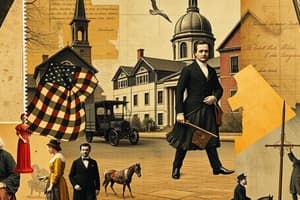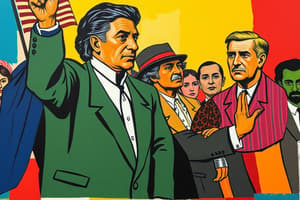Podcast
Questions and Answers
Who was John Tyler?
Who was John Tyler?
- A general in the Civil War
- 10th President of the United States (correct)
- A famous abolitionist
- 11th President of the United States
What was James Polk's notable belief?
What was James Polk's notable belief?
- Manifest Destiny (correct)
- Abolition of slavery
- Isolationism
- Monroe Doctrine
What was the Caroline incident?
What was the Caroline incident?
A ship raided by British while Americans rallied support to instigate a revolt.
What was the Webster Ashburton Treaty?
What was the Webster Ashburton Treaty?
Who was Abraham Lincoln?
Who was Abraham Lincoln?
What was the intent of the Treaty of Guadalupe-Hidalgo?
What was the intent of the Treaty of Guadalupe-Hidalgo?
James Slidell was a diplomat Polk sent to try to buy California for ___ million.
James Slidell was a diplomat Polk sent to try to buy California for ___ million.
What were spot resolutions?
What were spot resolutions?
Who was Harriet Tubman?
Who was Harriet Tubman?
What was the Compromise of 1850?
What was the Compromise of 1850?
What did the Ostend Manifesto advocate?
What did the Ostend Manifesto advocate?
What was the significance of the Wilmot Proviso?
What was the significance of the Wilmot Proviso?
What caused the Panic of 1857?
What caused the Panic of 1857?
Who was the author of Uncle Tom's Cabin?
Who was the author of Uncle Tom's Cabin?
Match the following key figures with their contributions:
Match the following key figures with their contributions:
What was the significance of the Emancipation Proclamation?
What was the significance of the Emancipation Proclamation?
What were Black Codes?
What were Black Codes?
Who was president during the beginning of the Civil War?
Who was president during the beginning of the Civil War?
The Battle of Bull Run showed that the Civil War would be ___ than previously expected.
The Battle of Bull Run showed that the Civil War would be ___ than previously expected.
Flashcards
Who was President after Harrison?
Who was President after Harrison?
John Tyler, the 10th President of the United States, served from 1841 to 1845, succeeding William Henry Harrison after his untimely death. He oversaw the annexation of Texas, a key expansionist move, and faced opposition within the Whig Party for his policies.
Who was known for Manifest Destiny and Texas' admission?
Who was known for Manifest Destiny and Texas' admission?
James K. Polk, the 11th President, passionately believed in Manifest Destiny, a philosophy that promoted U.S. expansion westward. During his term, Texas was admitted as the 28th state, solidifying his pro-expansionist agenda. He was nicknamed "Young Hickory" due to his association with Andrew Jackson, a prominent figure known for his strong leadership.
Who was President during the Civil War?
Who was President during the Civil War?
Abraham Lincoln, the 16th President, led the nation through the tumultuous Civil War. He is renowned for issuing the Emancipation Proclamation, which declared freedom for slaves in Confederate states. His tragic assassination by John Wilkes Booth on April 15, 1865, marked a pivotal moment in American history.
Who supported the Kansas-Nebraska Act?
Who supported the Kansas-Nebraska Act?
Signup and view all the flashcards
Who succeeded Zachary Taylor as President?
Who succeeded Zachary Taylor as President?
Signup and view all the flashcards
What were the Caroline and Creole incidents?
What were the Caroline and Creole incidents?
Signup and view all the flashcards
What was the Aroostook War?
What was the Aroostook War?
Signup and view all the flashcards
What treaty resolved boundary issues with Britain?
What treaty resolved boundary issues with Britain?
Signup and view all the flashcards
What did the Compromise of 1850 aim to achieve?
What did the Compromise of 1850 aim to achieve?
Signup and view all the flashcards
What was the Kansas-Nebraska Act?
What was the Kansas-Nebraska Act?
Signup and view all the flashcards
What was the Wilmot Proviso?
What was the Wilmot Proviso?
Signup and view all the flashcards
Who was known for the Underground Railroad?
Who was known for the Underground Railroad?
Signup and view all the flashcards
Who was a radical abolitionist known for violence?
Who was a radical abolitionist known for violence?
Signup and view all the flashcards
What was the Republican Party's key stance?
What was the Republican Party's key stance?
Signup and view all the flashcards
What was the Panic of 1857?
What was the Panic of 1857?
Signup and view all the flashcards
How did the South's economy function?
How did the South's economy function?
Signup and view all the flashcards
What was the Morrill Act?
What was the Morrill Act?
Signup and view all the flashcards
What marked the start of the Civil War?
What marked the start of the Civil War?
Signup and view all the flashcards
What document declared freedom for slaves in Confederate states?
What document declared freedom for slaves in Confederate states?
Signup and view all the flashcards
What agency aided freed slaves after the Civil War?
What agency aided freed slaves after the Civil War?
Signup and view all the flashcards
What were Black Codes?
What were Black Codes?
Signup and view all the flashcards
What was the Ku Klux Klan?
What was the Ku Klux Klan?
Signup and view all the flashcards
What was the Dred Scott decision?
What was the Dred Scott decision?
Signup and view all the flashcards
Which battle was the bloodiest single day of the Civil War?
Which battle was the bloodiest single day of the Civil War?
Signup and view all the flashcards
Who was a major Union general in the Civil War?
Who was a major Union general in the Civil War?
Signup and view all the flashcards
Who was a major Confederate general during the Civil War?
Who was a major Confederate general during the Civil War?
Signup and view all the flashcards
What was the Tenure of Office Act?
What was the Tenure of Office Act?
Signup and view all the flashcards
What was the Lecompton Constitution?
What was the Lecompton Constitution?
Signup and view all the flashcards
What novel helped shape anti-slavery sentiment?
What novel helped shape anti-slavery sentiment?
Signup and view all the flashcards
What book criticized slavery and its effects?
What book criticized slavery and its effects?
Signup and view all the flashcards
Study Notes
Political Figures and Events
- John Tyler served as the 10th President of the United States (1841-1845) after Harrison's death; responsible for the annexation of Texas and opposed elements of the Whig agenda.
- James Polk, the 11th President, believed in "Manifest Destiny" and facilitated Texas' admission as the 28th state; known as "Young Hickory."
- Abraham Lincoln, the 16th President, led the nation during the Civil War, issued the Emancipation Proclamation, and was assassinated by John Wilkes Booth.
- Franklin Pierce became the 14th President; his support for the Kansas-Nebraska Act diminished his popularity in the North.
- Millard Fillmore succeeded Zachary Taylor after his death and aided in passing the Compromise of 1850.
Key Conflicts and Treaties
- The Caroline and Creole incidents exemplified tensions with Britain; the Caroline was raided, and the Creole slave ship incident incited fears among slaveholding nations.
- The Aroostook War, also known as the "Lumber Jack War," arose over land disputes between Maine and Canada.
- The Webster-Ashburton Treaty resolved boundary disputes between the U.S. and Britain, including the Maine border.
Legislation and Compromises
- The Compromise of 1850 admitted California as a free state, enforced the Fugitive Slave Act, and established popular sovereignty in some territories.
- The Kansas-Nebraska Act (1854) created Kansas and Nebraska, allowing residents to determine their slavery status through popular sovereignty.
- The Wilmot Proviso sought to prevent slavery in territories acquired from Mexico, though it never passed.
Social Movements and Incidents
- Harriet Tubman was a seminal abolitionist and conductor of the Underground Railroad, aiding the escape of slaves to freedom.
- John Brown became known for his radical abolitionist efforts, including the Pottawatomie Massacre and the raid on Harpers Ferry.
- The Republican Party emerged as a significant political force opposing the spread of slavery, characterized as the first truly sectional party.
Economic Conditions and Social Implications
- The Panic of 1857, triggered by overspeculation, led to severe economic downturns affecting mostly Northern states.
- The Southern economy was heavily reliant on cotton, which constituted three-quarters of U.S. exports during the period.
- The Morrill Act (1862) aimed to promote education by providing federal land to establish agricultural schools.
Civil War and Reconstruction
- The attack on Fort Sumter marked the beginning of the Civil War in 1861.
- The Emancipation Proclamation declared that all slaves in Confederate states would be free.
- The Freedman's Bureau aimed to assist newly freed slaves through various social and economic programs.
Racial and Political Tensions
- Black Codes were enacted in southern states to restrict the rights of freed blacks after the Civil War.
- The Ku Klux Klan emerged as a violent white supremacist group in response to Reconstruction.
- The Dred Scott decision declared that slaves were property, nullifying any rights granted by the Missouri Compromise.
Significant Battles and Military Leaders
- Antietam became the bloodiest single day in American history, resulting in approximately 23,000 casualties.
- Ulysses S. Grant commanded Union forces towards the war's end and later became the 18th President.
- Robert E. Lee was a revered Confederate general, known for his tactical brilliance throughout the Civil War.
Controversial Acts and Legislation
- The Tenure of Office Act (1866) limited the President's ability to remove officials without senatorial approval, directly leading to Andrew Johnson's impeachment.
- The Lecompton Constitution sought to establish slavery in Kansas, facing rejection in a referendum.
Important Cultural and Intellectual Contributions
- Harriet Beecher Stowe’s novel Uncle Tom's Cabin played a crucial role in shaping anti-slavery sentiment in the U.S. and abroad.
- The "Impending Crisis" by Hinton Helper criticized slavery for holding back the South's economic progress.
Studying That Suits You
Use AI to generate personalized quizzes and flashcards to suit your learning preferences.




